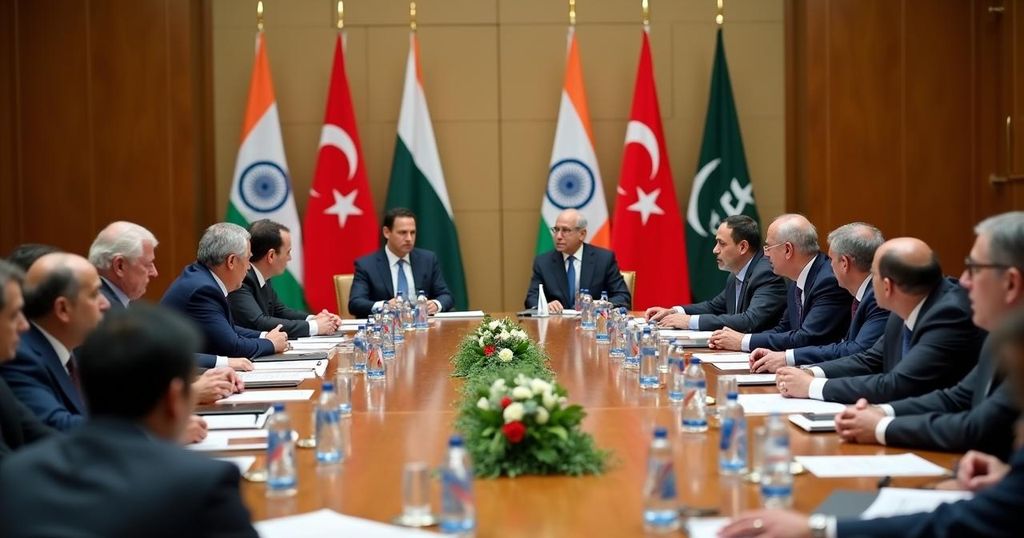No Bilateral Meeting Between India and Pakistan During SCO Summit

Neither India nor Pakistan has requested a bilateral meeting during the upcoming SCO summit in Islamabad, as stated by Pakistan’s Foreign Minister Ishaq Dar. External Affairs Minister S. Jaishankar’s visit marks a significant occasion, yet experts remain skeptical about any progress in India-Pakistan relations. The backdrop includes heightened security due to internal protests in Pakistan and ongoing regional tensions.
India and Pakistan have not requested a bilateral meeting in light of Indian External Affairs Minister S. Jaishankar’s impending visit to Islamabad for the Shanghai Cooperation Organisation (SCO) Heads of Government summit on October 15-16, as stated by Pakistan’s Foreign Minister, Ishaq Dar. While Pakistan plans to extend the full diplomatic protocol to Mr. Jaishankar, who has expressed his intent to participate as a strong member of the SCO, there remains a notable lack of dialogue between the two nations regarding a direct meeting. As leaders from the SCO member states, including high-ranking officials from Iran, Belarus, Kazakhstan, Kyrgyzstan, Tajikistan, and Uzbekistan are set to arrive in Islamabad, there is keen anticipation regarding potential interactions between Mr. Jaishankar and other global leaders. Noteworthy is the early arrival of Russian Prime Minister Mikhail Mishustin and Chinese Premier Li Qiang, who are scheduled for preliminary bilateral meetings. The prevailing speculation revolves around whether Mr. Jaishankar will meet with the Chinese Premier, especially in light of the upcoming BRICS summit, where Indian Prime Minister Narendra Modi and Chinese President Xi Jinping might discuss ongoing military tensions along the Line of Actual Control. Experts, however, caution against expectations of significant advancements in India-Pakistan relations during this visit, marking it as the first by an Indian Foreign Minister in nearly a decade. The last such event was in 2015, which ultimately did not yield lasting results. Moreover, the Pakistani government has voiced concerns over security arrangements in Islamabad due to a planned protest by the Opposition party, Pakistan Tehreek-e-Insaf (PTI), led by former Prime Minister Imran Khan, resulting in heightened police deployment. In a controversial statement, a senior minister suggested India might be exploiting the internal unrest in Pakistan to undermine the summit, underscoring the current tensions between the two countries. Overall, the agenda for the upcoming SCO meeting is firmly established as multilateral, with no plans for bilateral discussions between India and Pakistan.
The context surrounding the SCO meeting is highly influenced by the historical tensions and complex diplomatic relations between India and Pakistan. The SCO, comprising several Asian and Eurasian countries, is vital for discussions on security and cooperation, yet the absence of a bilateral engagement signals ongoing challenges in India-Pakistan diplomacy. In recent years, there has been a notable stagnation in discussions on trade and connectivity between the two nations, contributing to the estrangement reflected in current events. With the backdrop of significant domestic unrest in Pakistan and its implications for regional stability, understanding the dynamics of this gathering requires an appreciation of both countries’ historical adversities and current geopolitical landscapes.
In conclusion, the absence of a requested bilateral meeting between India and Pakistan during the SCO summit highlights the ongoing complexities of diplomatic interactions between the two nations. Despite the ceremonial preparations for Mr. Jaishankar’s visit, there is an evident lack of expectations for meaningful dialogue, particularly in light of internal challenges facing Pakistan. The prevailing atmosphere remains tense, as recent political developments may further complicate the relationship ahead of significant international summits. The situation reflects broader regional tensions that will require careful navigation by both nations moving forward.
Original Source: www.thehindu.com








